Fleurs du Mal Magazine


Or see the index

The Sorrows of Young Werther (73 = The end) by J.W. von Goethe The house, the neighbourhood, and the whole town were immediately in commotion. Albert arrived. They had laid Werther on the bed: his head was bound up, and the paleness of death was upon his face. His limbs were motionless; but he still breathed, at one time strongly, then weaker--his death was momently expected. He had drunk only one glass of the wine. "Emilia Galotti" lay open upon his bureau. I shall say nothing of Albert's distress, or of Charlotte's grief.The old steward hastened to the house immediately upon hearing the news: he embraced his dying friend amid a flood of tears. His eldest boys soon followed him on foot. In speechless sorrow they threw themselves on their knees by the bedside, and kissed his hands and face. The eldest, who was his favourite, hung over him till he expired; and even then he was removed by force. At twelve o'clock Werther breathed his last. The presence of the steward, and the precautions he had adopted, prevented a disturbance; and that night, at the hour of eleven, he caused the body to be interred in the place which Werther had selected for himself. The steward and his sons followed the corpse to the grave. Albert was unable to accompany them. Charlotte's life was despaired of. The body was carried by labourers. No priest attended. THE END The Sorrows of Young Werther (Die Leiden des jungen Werther) by J.W. von Goethe. Translated by R.D. Boylan. fleursdumal.nl magazine
More in: -Die Leiden des jungen Werther, Goethe, Johann Wolfgang von
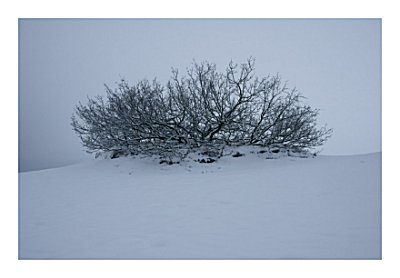
Christina Rossetti
(1830-1894)
A Hymn For Christmas Day
The Shepherds watch their flocks by night,
Beneath the moon’s unclouded light,
All around is calm and still,
Save the murm’ring of the rill:
When lo! a form of light appears,
And on the awe-struck Shepherds’ ears
Are words, of peace and comfort flowing
From lips with love celestial glowing.
Spiritual forms are breaking
Through the gloom, their voices taking
Part in the adoring song
Of the bright angelic throng.
Wondering the Shepherds bend
Their steps to Bethlehem, and wend
To a poor and crowded inn: –
Tremblingly their way they win
To the stable, where they find
The Redeemer of mankind,
Just born into this world of danger,
Lying in an humble manger.
And they spread abroad each word
Which that joyful night they’d heard,
And they glorified the name
Of their gracious God, Who came
Himself to save from endless woe
The offspring of this world below.
Source: The Complete Poems of Christina Rossetti, Vol. 3, p. 122, R. W. Crump, ed. (Penguin, 2001). Photo Hans Hermans @2010
fleursdumal.nl magazine
More in: Archive Q-R, Rossetti, Christina

Aline (Murray) Kilmer
(1888-1941)
If I Had loved You More
If I had loved you more God would have had pity;
He would never have left me here in this desolate place,
Left me to go on my knees to the door of Heaven
Crying in vain for a little sight of your face.
How could I know that the earth would be dark without you?
For you were always the lover and I the friend.
Now if there were any hope that I might find you
I would go seeking you to the world’s end.
“God is a jealous God. You have loved too wildly,
You have loved too well!” one said.
I bowed my head, but my heart in scorn was crying
That you whom I had not loved enough are dead.
I look on my heart and see it is hard and narrow,
That my loves are slight and last but a little space.
But why do I go on my knees to the door of Heaven
Crying for only a little sight of your face?
Aline Kilmer poetry
fleursdumal.nl magazine
More in: Archive M-N, CLASSIC POETRY

Alfred Lord Tennyson
(1809-1892)
The Brook
I come from haunts of coot and hern,
I make a sudden sally
And sparkle out among the fern,
To bicker down a valley.
By thirty hills I hurry down,
Or slip between the ridges,
By twenty thorpes, a little town,
And half a hundred bridges.
Till last by Philip’s farm I flow
To join the brimming river,
For men may come and men may go,
But I go on for ever.
I chatter over stony ways,
In little sharps and trebles,
I bubble into eddying bays,
I babble on the pebbles.
With many a curve my banks I fret
By many a field and fallow,
And many a fairy foreland set
With willow-weed and mallow.
I chatter, chatter, as I flow
To join the brimming river,
For men may come and men may go,
But I go on for ever.
I wind about, and in and out,
With here a blossom sailing,
And here and there a lusty trout,
And here and there a grayling,
And here and there a foamy flake
Upon me, as I travel
With many a silvery waterbreak
Above the golden gravel,
And draw them all along, and flow
To join the brimming river
For men may come and men may go,
But I go on for ever.
I steal by lawns and grassy plots,
I slide by hazel covers;
I move the sweet forget-me-nots
That grow for happy lovers.
I slip, I slide, I gloom, I glance,
Among my skimming swallows;
I make the netted sunbeam dance
Against my sandy shallows.
I murmur under moon and stars
In brambly wildernesses;
I linger by my shingly bars;
I loiter round my cresses;
And out again I curve and flow
To join the brimming river,
For men may come and men may go,
But I go on for ever.
Alfred Lord Tennyson poetry
fleursdumal.nl magazine
More in: Archive S-T, Tennyson, Alfred Lord
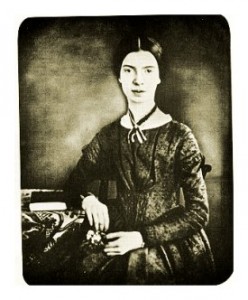
Emily Dickinson
(1830-1886)
The Martyr Poets
The Martyr Poets did not tell,
But wrought their Pang in syllable:
That, when their mortal name be numb,
Their mortal fate encourage Some.
The Martyr Painters never spoke,
Bequeathing—rather—to their Work:
That when their conscious fingers cease,
Some seek in Art the Art of Peace.
[4-voetige jambische regels, rijmschema aabb, 1 halfrijm]
De Dichter Martelaars
De Dichter Martelaars spraken niet,
Hun pijn bleek sprekend uit hun lied:
Dat men, hun naam gedood voorgoed,
Soms uit hun noodlot put voor moed.
De Schilder Martelaars, spraken nooit,
Vermaakten— veeleer—Werk voltooid;
Dat men, hun hand zijn vormkracht kwijt,
Uit Kunst, soms Vredeskunst bereidt.
Vertaling Cornelis W. Schoneveld
fleursdumal.nl magazine
More in: Archive C-D, Dickinson, Dickinson, Emily, TRANSLATION ARCHIVE
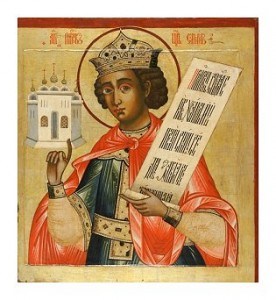
Chapter 1
The song of songs, which is Solomon’s.
Let him kiss me with the kisses of his mouth: for thy love is better than wine.
Because of the savour of thy good ointments thy name is as ointment poured forth, therefore do the virgins love thee.
Draw me, we will run after thee: the king hath brought me into his chambers: we will be glad and rejoice in thee, we will remember thy love more than wine: the upright love thee.
I am black, but comely, O ye daughters of Jerusalem, as the tents of Kedar, as the curtains of Solomon.
Look not upon me, because I am black, because the sun hath looked upon me: my mother’s children were angry with me; they made me the keeper of the vineyards; but mine own vineyard have I not kept.
Tell me, O thou whom my soul loveth, where thou feedest, where thou makest thy flock to rest at noon: for why should I be as one that turneth aside by the flocks of thy companions?
If thou know not, O thou fairest among women, go thy way forth by the footsteps of the flock, and feed thy kids beside the shepherds’ tents.
I have compared thee, O my love, to a company of horses in Pharoah’s chariots.
Thy cheeks are comely with rows of jewels, thy neck with chains of gold.
We will make thee borders of gold with studs of silver.
While the king sitteth at his table, my spikenard sending forth the smell thereof.
A bundle of myrrh is my well-beloved unto me; he shall lie all night betwixt my breasts.
My beloved is unto me as a cluster of camphire in the vineyards of Engedi.
Behold, thou art fair, my love; behold, thou art fair; thou hast doves’ eyes.
Behold thou art fair, my beloved, yea pleasant: also our bed is green.
The beams of our house are cedar, and our rafters of fir.
Chapter 2
I am the rose of Sharon, and the lily of the valleys.
As the lily among thorns, so is my love among the daughters.
As the apple tree among the trees of the wood, so is my beloved among the suns. I sat down under his shadow with great delight, and his fruit was sweet to my taste.
He brought me to the banquetting house, and his banner over me was love.
Stay me with flagons, comfort me with apples: for I am sick of love.
His left hand is under my head, and his right hand doth embrace me.
I charge you, O ye daughters of Jerusalem, by the roes, and by the hinds of the field, that ye stir not up, nor awake my love, till he please.
The voice of my beloved! behold, he cometh leaping upon the mountains, skipping upon the hills.
My beloved is like a roe or a young hart: behold, he standeth behind our wall, he looketh forth at the windows, shewing himself through the lattice.
My beloved spake, and said unto me, Rise up, my love, my fair one, and come away.
For, lo, the winter is past, the rain is over and gone;
The flowers appear on the earth; the time of the singing of birds is come, and the voice of the turtle is heard in our land;
The fig tree putteth forth her green figs, and the vines with the tender grape give a good smell. Arise, my love, my fair one, and come away.
O my dove, that art in the clefts of the rock, in the secret places of the stairs, let me see thy countenance, let me hear thy voice; for sweet is thy voice, and thy countenance is comely.
Take us the foxes, the little foxes, that spoil the vines: for our vines have tender grapes.
My beloved is mine, and I am his; he feedeth among the lilies.
Until the day break, and the shadows flee away, turn, my beloved, and be thou like a roe or a young hart upon the mountains of Bether.
Chapter 3
By night on my bed I sought him whom my soul loveth: I sought him, but I found him not
I will rise now, and go about the city in the streets, and in the broad ways I will seek him whom my soul loveth: I sought him, but I found him not.
The watchman that go about the city found me: to whom I said, Saw ye him whom my soul loveth?
It was but a little that I passed from them, but I found him who my soul loveth: I held him, and would not let him go, until I had brought him into my mother’s house, and into the chamber of her that had conceived me.
I charge you, O ye daughters of Jerusalem, by the roes, and by the hinds of the field, that ye stir not up, nor awake my love, till he please.
Who is this that cometh out of the wilderness like pillars of smoke, perfumed with myrrh and frankincense, with all powders of the merchant?
Behold his bed, which is Solomon’s; threescore valiant men are about it, of the valiant of Israel.
They all hold swords, being expert in war: every man has his sword upon his thigh because of fear in the night.
King Solomon made himself a chariot of the wood of Lebanon.
He made the pillars thereof of silver, the bottom thereof of gold, the covering of it of purple, the midst thereof being paved with love, for the daughters of Jerusalem.
Go forth, O ye daughters of Zion, and behold King Solomon with the crown wherewith his mother crowned him in the day of his espousals, and in the day of the gladness of his heart.
Chapter 4
Behold, thou art fair, my love; behold, thou art fair; thou hast doves’ eyes within thy locks, thy hair is a flock of goats, that appear from mount Gilead.
Thy teeth are like a flock of sheep that are even shorn, which came up from the washing; whereof every one bear twins, and none is barren among them.
Thy lips are like a thread of scarlet, and thy speech is comely: thy temples are like a piece of pomegranate within thy locks.
Thy neck is like the tower of David builded for an armoury, whereupon there hang a thousand bucklers, all shields of mighty men.
Thy two breasts are like two young roes that are twins, which feed among the lilies.
Until the day break, and the shadows flee away, I will get me to the mountain of myrrh, and to the hill of frankincense.
Thou art all fair, my love; there is no spot in thee.
Come with me from Lebanon, my spouse, with me from Lebanon: Look from the top of Amana, from the top of Shenir and Hermon, from the lions’ dens, from the mountains of the leopards.
Thou hast ravished my heart, my sister, my spouse; thou hast ravished my heart with one of thine eyes, with one chain of thy neck.
How fair is thy love, my sister, my spouse! how much better is thy love than wine! and the smell of thy ointments than all spices!
Thy lips, O my spouse, drop as the honeycomb: honey and milk are under thy tongue; and the smell of thy garments is like the smell of Lebanon.
A garden inclosed is my sister, my spouse; a spring shut up, a fountain sealed.
Thy plants are an orchard of pomegranates, with pleasant fruits; camphire, with spikenard,
Spikenard and saffron; calamus and cinnamon, with all trees of frankincense; myrrh and aloes, with all the chief spices:
A fountain of gardens, a well of living waters, and streams from Lebanon.
Awake, O north wind; and come, thou south; blow upon my garden, that the spices thereof may flow out. Let my beloved come into his garden, and eat his pleasant fruits.
Chapter 5
I am come into my garden, my sister, my spouse: I have gathered my myrrh with my spice; I have eaten my honeycomb with my honey; I have drunk my wine with my milk: eat, O friends; drink, yea, drink abundantly, O beloved.
I sleep, but my heart waketh: it is the voice of my beloved that knocketh, saying, Open to me, my sister, my love, my dove, my undefiled: for my head is filled with dew, and my locks with the drops of the night.
I have put off my coat; how shall I put it on? I have washed my feet; how shall I defile them?
My beloved put in his hand by the hole of the door, and my bowels were moved for him.
I rose up to open to my beloved; and my hands dropped with myrrh, and my fingers with sweet-smelling myrrh, upon the handles of the lock.
I opened to my beloved; but my beloved had withdrawn himself, and was gone; my soul failed when he spake: I sought him, but I could not find him; I called him, but he gave me no answer.
The watchmen that went about the city found me, they smote me, they wounded me; the keepers of the walls took away my veil from me.
I charge you, O daughters of Jerusalem, if ye find my beloved, that ye tell him, that I am sick of love.
What is thy beloved more than another beloved, O thou fairest among women? what is thy beloved more than another beloved, that thou dost so charge us?
My beloved is white and ruddy, the chiefest among ten thousand.
His head is as the most fine gold, his locks are bushy, and black as a raven.
His eyes are as the eyes of doves by the rivers of waters, washed with milk, and fitly set.
His cheeks are as a bed of spices, as sweet flowers: his lips like lillies, dropping sweet smelling myrrh.
His hands are as gold rings set with the beryl: his belly is as bright ivory overlaid with sapphires.
His legs are as pillars of marble, set upon sockets of fine gold: his countenance is as Lebanon, excellent as the cedars.
His mouth is most sweet: yea, he is altogether lovely. This is my beloved, and this is my friend, O daughters of Jerusalem.
Chapter 6
Whither is thy beloved gone, O thou fairest among women? whither is thy beloved turned aside? that we may seek him with thee.
My beloved is gone down into his garden, to the beds of spices, to feed in the gardens, and to gather lilies.
I am my beloved’s, and my beloved is mine: he feedeth among the lilies.
Thou art beautiful, O my love, as Tirzah, comely as Jerusalem, terrible as an army with banners.
Turn away thine eyes from me, for they have overcome me: thy hair is as a flock of goats that appear from Gilead.
Thy teeth are as a flock of sheep which go up from the washing, whereof every one beareth twins, and there is not one barren among them.
As a piece of a pomegranate are thy temples within thy locks.
There are threescore queens, and fourscore concubines, and virgins without number.
My dove, my undefiled is but one; she is the only one of her mother, she is the choice one of her that bare her. The daughters saw her, and blessed her; yea, the queens and the concubines, and they praised her.
Who is she that looketh forth as the morning, fair as the moon, clear as the sun, and terrible as an army with banners?
I went down into the garden of nuts to see the fruits of the valley, and to see whether the vine flourished, and the pomegranates budded.
Or ever I was aware, my soul made me like the chariots of Amminadib.
Return, return, O Shulamite; return, return, that we may look upon thee. What will ye see in the Shulamite? As it were the company of two armies.
Chapter 7
How beautiful are thy feet with shoes, O prince’s daughter! the joints of thy thighs are like jewels, the work of the hands of a cunning workman.
Thy navel is like a round goblet, which wanteth not liquor: thy belly is like an heap of wheat set about with lilies.
Thy two breasts are like two young roes that are twins.
Thy neck is as a tower of ivory; thine eyes like the fishpools in Heshbon, by the gate of Bathrabbim: thy nose is as the tower of Lebanon which looketh toward Damascus.
Thine head upon thee is like Carmel, and the hair of thy head like purple; the king is held in the galleries.
How fair and how pleasant art thou, O love, for delights!
This thy stature is like to a palm tree, and thy breasts to clusters of groups.
I said, I will go up to the palm tree, I will take hold of the boughs thereof: now also thy breasts shall be as clusters of the vine, and the smell of thy nose like apples;
And the roof of thy mouth like the best wine for my beloved, that goeth down sweetly, causing the lips of those that are asleep to speak.
I am my beloved’s, and his desire is toward me.
Come, my beloved, let us go forth into the field; let us lodge in the villages.
Let us get up early to the vineyards; let us see if the vine flourish, whether the tender grape appear, and the pomegranates bud forth: there will I give thee my loves.
The mandrakes give a smell, and at our gates are all manners of pleasant fruits, new and old, which I have laid up for thee, O my beloved.
Chapter 8
O that thou wert as my brother, that sucked the breasts of my mother! when I should find thee without, I would kiss thee; yea, I should not be despised.
I would lead thee, and bring thee into my mother’s house, who would instruct me: I would cause thee to drink of spiced wine of the juice of my pomegranate.
His left hand should be under my head, and his right hand should embrace me.
I charge you, O daughters of Jerusalem, that ye stir not up, nor awake my love, until he please.
Who is this that cometh up from the wilderness, leaning upon her beloved? I raised thee up under the apple tree: there thy mother brought thee forth: there she brought thee forth that bare thee.
Set me as a seal upon thine heart, as a seal upon thine arm: for love is strong as death; jealousy is cruel as the grave: the coals thereof are coals of fire, which hath a most vehement flame.
Many waters cannot quench love, neither can the floods drown it: if a man would give all the substance of his house for love, it would utterly be contemned.
We have a little sister, and she hath no breasts: What shall we do for our sister in the day when she shall be spoken for?
If she be a wall, we will build upon her a palace of silver: and if she be a door, we will inclose her with boards of cedar.
I am a wall, and my breasts like towers: then was I in his eyes as one that found favour.
Solomon had a vineyard at Baalhamon; he let out the vineyard unto keepers; every one for the fruit thereof was to bring a thousand pieces of silver.
My vineyard, which is mine, is before me: thou, O Solomon, must have a thousand, and those that keep the fruit thereof two hundred.
Thou hast dwellest in the gardens, the companions hearken to thy voice: cause me to hear it.
Make haste, my beloved, and be thou like to a roe or to a young hart upon the mountains of spices.
From the Authorized King James Version of the Christian Bible
Solomon, King of Israel, 970-933 BC
fleursdumal.nl magazine
More in: Archive S-T, CLASSIC POETRY
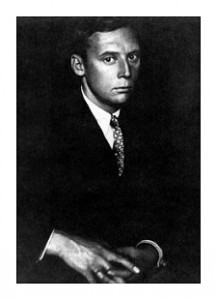
Johannes Theodor Baargeld
(1892-1927)
Es war einmal ein rares Kind
Es war einmal ein rares Kind,
Das war, wie solche Vöglein sind:
Sie wachsen und gedeihen
Und füttern ihre Eigenart
Vom alten Jahr zum neuen.
Es irrt der Mensch, solang er lebt,
Und Manches seltsam an ihm klebt,
Zumal wenn er nach Geistigem strebt;
Doch peinlich ist es immer,
Besteht sein ganzer Geistesschwanz
Aus allerfaulstem Flimmer.
Gib Mensch, solang Du geben kannst,
Bedenk zuletzt den eignen Wanst!
Wie schön wär’s unter Christen,
Lenkt nicht solch Vöglein eigner Art
Ins saubre Christennest die Fahrt:
Die Frucht aus seinem Nisten
darf dann der Christe misten.
Drum Mensch, siehst Du solch Vöglein ziehn
Dank Gott, wenn Winde er verliehn,
Die in die Täler streichen:
Denn zieht das Tierchen bei Dir ein,
So ist’s zum Herzerweichen.
(1922)
Johannes Theodor Baargeld poetry
fleursdumal.nl magazine
More in: Archive A-B, Baargeld, Johannes Theodor
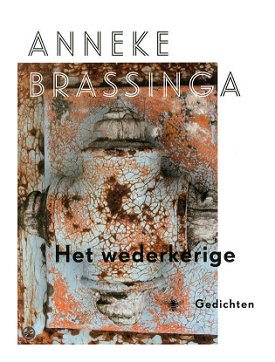
Het bestuur van de Stichting P.C. Hooft-prijs voor Letterkunde heeft afgelopen dinsdag bekend gemaakt dat de P.C. Hooft-prijs 2015 wordt toegekend aan de dichteres Anneke Brassinga (1948).
De P.C. Hooft-prijs is een van de belangrijkste literaire prijzen van Nederland. De oeuvreprijs wordt jaarlijks afwisselend toegekend voor proza, essays en poëzie. Dit jaar is de prijs, waaraan een bedrag is verbonden van 60.000 euro, bestemd voor poëzie.
De prijs wordt op 21 mei 2015, de sterfdag van dichter P.C. Hooft (1581-1647), uitgereikt.
Brassinga debuteerde in 1987 met de bundel Aurora. Daarna publiceerde ze nog een tiental dichtbundels. Haar laatste dichtbundel was, Ontij (2010). Anneke Brassinga publiceerde, naast poëzie, veel essays en verhalen. Verder heeft ze veel vertaalwerk verricht, waaronder de vertaling van boeken van o.a. schrijvers als Oscar Wilde, Jules Verne, Vladimir Nabokov en Sylvia Plath.
De dichteres wordt door de jury geprezen om het gebruik van bijna vergeten of in onbruik geraakte woorden. ‘In elk gedicht openen zich onvermoede vergezichten van zeggingskracht. De taal wordt omgekeerd, uitgekleed en weer opnieuw uitgedost totdat alle registers die er ooit in voorgekomen zijn weer meedoen.’
De jury van de prijs bestond dit jaar uit Wim Brands, Anja de Feijter, Rozalie Hirs, Erik Lindner en Maaike Meijer.
fleursdumal.nl magazine
More in: - Book News, Archive A-B, Art & Literature News, Sylvia Plath

The Sorrows of Young Werther (72) by J.W. von Goethe A neighbour saw the flash, and heard the report of the pistol; but, as everything remained quiet, he thought no more of it. In the morning, at six o'clock, the servant went into Werther's room with a candle. He found his master stretched upon the floor, weltering in his blood, and the pistols at his side. He called, he took him in his arms, but received no answer. Life was not yet quite extinct. The servant ran for a surgeon, and then went to fetch Albert. Charlotte heard the ringing of the bell: a cold shudder seized her. She wakened her husband, and they both rose. The servant, bathed in tears faltered forth the dreadful news. Charlotte fell senseless at Albert's feet.When the surgeon came to the unfortunate Werther, he was still lying on the floor; and his pulse beat, but his limbs were cold. The bullet, entering the forehead, over the right eye, had penetrated the skull. A vein was opened in his right arm: the blood came, and he still continued to breathe. From the blood which flowed from the chair, it could be inferred that he had committed the rash act sitting at his bureau, and that he afterward fell upon the floor. He was found lying on his back near the window. He was in full-dress costume. The Sorrows of Young Werther (Die Leiden des jungen Werther) by J.W. von Goethe. Translated by R.D. Boylan. To be continued fleursdumal.nl magazine
More in: -Die Leiden des jungen Werther, Goethe, Johann Wolfgang von
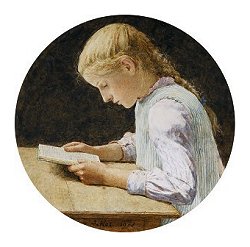
Lewis Carroll
(1832-1898)
Father William
‘You are old, Father William,’ the young man said,
‘And your hair has become very white;
And yet you incessantly stand on your head –
Do you think, at your age, it is right?’
‘In my youth,’ Father William replied to his son,
‘I feared it might injure the brain;
But now that I’m perfectly sure I have none,
Why, I do it again and again.’
‘You are old,’ said the youth, ‘as I mentioned before,
And have grown most uncommonly fat;
Yet you turned a back-somersault in at the door –
Pray, what is the reason of that?’
‘In my youth,’ said the sage, as he shook his grey locks,
‘I kept all my limbs very supple
By the use of this ointment – one shilling a box –
Allow me to sell you a couple?’
‘You are old,’ said the youth, ‘and your jaws are too weak
For anything tougher than suet;
Yet you finished the goose, with the bones and the beak –
Pray, how did you manage to do it?’
‘In my youth,’ said his father, ‘I took to the law,
And argued each case with my wife;
And the muscular strength that it gave to my jaw,
Has lasted the rest of my life.’
‘You are old,’ said the youth, ‘one would hardly suppose
That your eye was as steady as ever;
Yet you balanced an eel on the end of your nose –
What made you so awfully clever?’
‘I have answered three questions, and that is enough,’
Said his father; ‘don’t give yourself airs!
Do you think I can listen all day to such stuff?
Be off, or I’ll kick you down stairs!’
Lewis Carroll poetry
fleursdumal.nl magazine
More in: Archive C-D, Carroll, Lewis
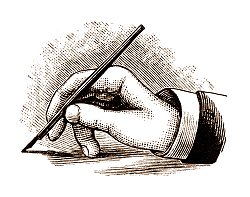
Robert Herrick
(1591-1674)
Counsel To Girls
(To Virgins, To Make Much of Time)
Gather ye rose-buds while ye may,
Old time is still a-flying:
And this same flower that smiles to-day,
Tomorrow will be dying.
The glorious Lamp of Heaven, the Sun,
The higher he’s a-getting
The sooner will his race be run,
And nearer he’s to setting.
That age is best which is the first,
When youth and blood are warmer;
But being spent, the worse, and worst,
Times, still succeed the former.
Then be not coy, but use your time;
And while ye may, go marry:
For having lost but once your prime,
You may for ever tarry.
Robert Herrick poetry
fleursdumal.nl magazine
More in: Archive G-H, CLASSIC POETRY

Wilfred Owen
(1893 – 1918)
A Terre
(being the philosophy of many soldiers)
Sit on the bed. I’m blind, and three parts shell.
Be careful; can’t shake hands now; never shall.
Both arms have mutinied against me,-brutes.
My fingers fidget like ten idle brats.
I tried to peg out soldierly,-no use!
One dies of war like any old disease.
This bandage feels like pennies on my eyes.
I have my medals?-Discs to make eyes close.
My glorious ribbons?-Ripped from my own back
In scarlet shreds. (That’s for your poetry book.)
A short life and a merry one, my buck!
We used to say we’d hate to live dead-old,-
Yet now…I’d willingly be puffy, bald,
And patriotic. Buffers catch from boys
At least the jokes hurled at them. I suppose
Little I’d ever teach a son, but hitting,
Shooting, war, hunting, all the arts of hurting.
Well, that’s what I learnt,-that, and making money.
Your fifty years ahead seem none too many?
Tell me how long I’ve got? God! For one year
To help myself to nothing more than air!
One Spring! Is one too good to spare, too long?
Spring wind would work its own way to my lung,
And grow me legs as quick as lilac-shoots.
My servant’s lamed, but listen how he shouts!
When I’m lugged out, he’ll still be good for that.
Here in this mummy-case, you know, I’ve thought
How well I might have swept his floors for ever.
I’d ask no nights off when the bustle’s over,
Enjoying so the dirt. Who’s prejudiced
Against a grimed hand when his own’s quite dust,
Less live than specks that in the sun-shafts turn,
Less warm than dust that mixes with arms’ tan?
I’d love to be a sweep, now, black as Town,
Yes, or a muckman. Must I be his load?
O Life, Life, let me breathe,-a dug-out rat!
Not worse than ours the lives rats lead-
Nosing along at night down some safe rut,
They find a shell-proof home before they rot.
Dead men may envy living mites in cheese,
Or good germs even. Microbes have their joys,
And subdivide, and never come to death.
Certainly flowers have the easiest time on earth.
‘I shall be one with nature, herb, and stone’
Shelley would tell me. Shelley would be stunned:
The dullest Tommy hugs that fancy now.
‘Pushing up daisies’ is their creed, you know.
To grain, then, go my fat, to buds my sap,
For all the usefulness there is in soap.
D’you think the Boche will ever stew man-soup?
Some day, no doubt, if…Friend, be very sure
I shall be better off with plants that share
More peaceably the meadow and the shower.
Soft rains will touch me,-as they could touch once,
And nothing but the sun shall make me ware.
Your guns may crash around me. I’ll not hear;
Or, if I wince, I shall not know I wince.
Don’t take my soul’s poor comfort for your jest.
Soldiers may grow a soul when turned to fronds,
But here’s the thing’s best left at home with friends.
My soul’s a little grief, grappling your chest,
To climb your throat on sobs; easily chased
On other sighs and wiped by fresher winds.
Carry my crying spirit till it’s weaned
To do without what blood remained these wounds.
Wilfred Owen poetry
fleursdumal.nl magazine
More in: *War Poetry Archive, Archive O-P, Owen, Wilfred
Thank you for reading Fleurs du Mal - magazine for art & literature